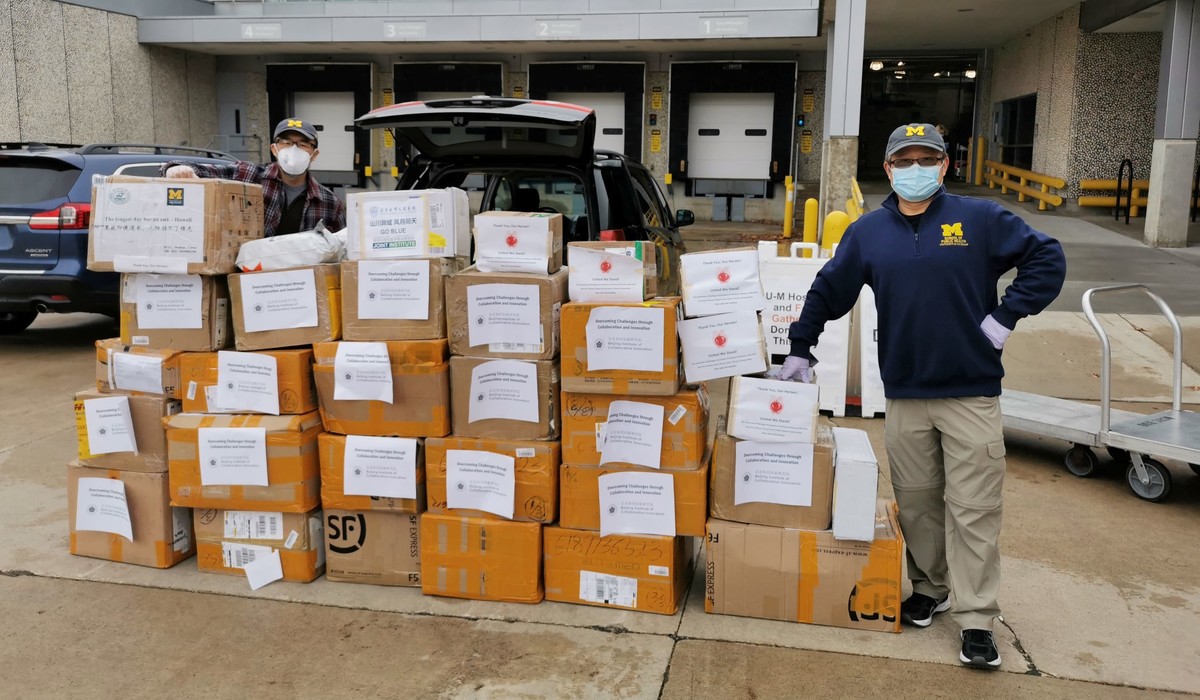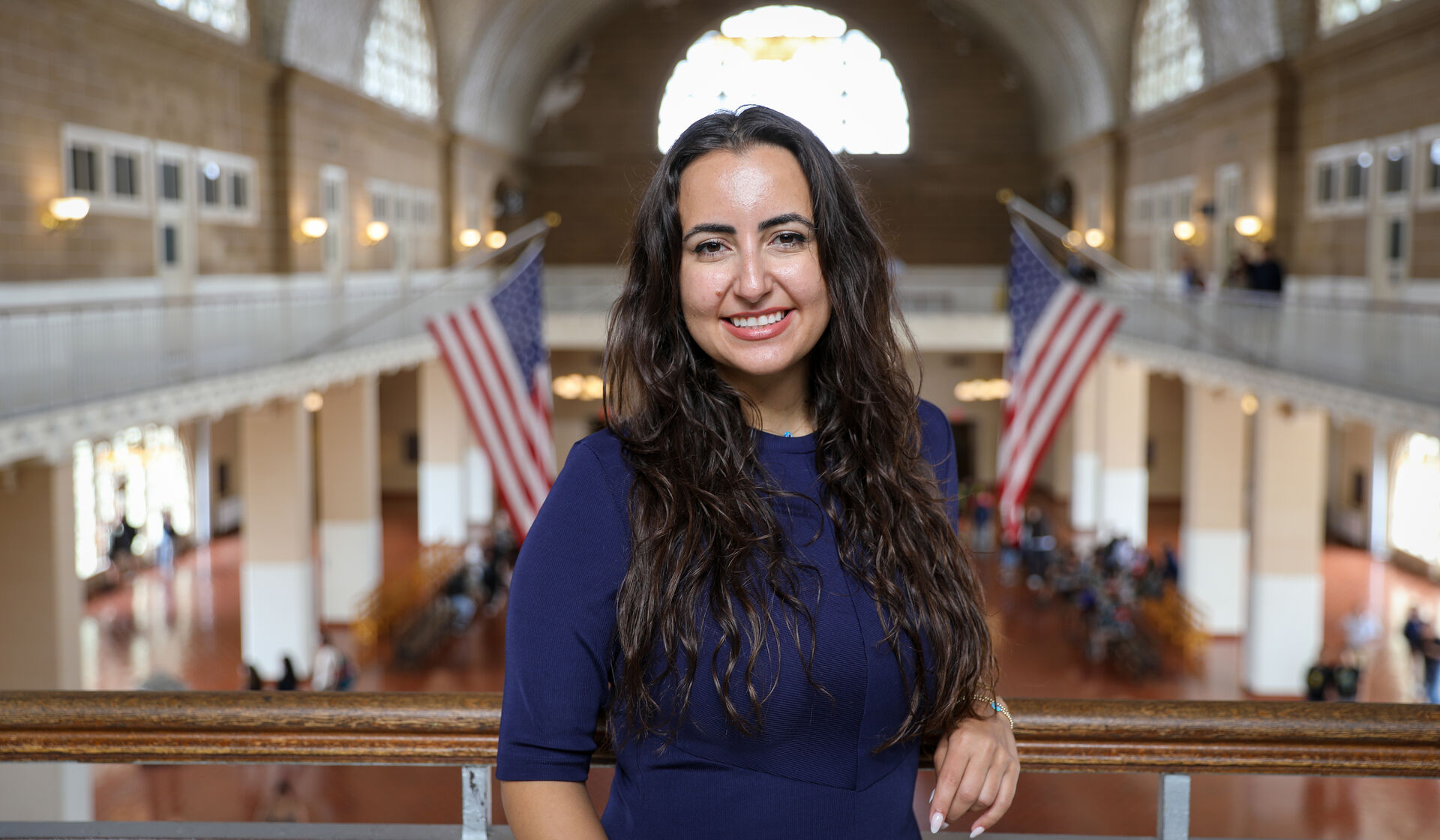As night descended upon Ann Arbor on April 22, Andy and Anna Mignery marched into their Thrive Juicery shop in the city’s Burns Park neighborhood for a night of tedious labor — atypical toil amid the COVID-19 pandemic’s atypical times.
Over four hours, the entrepreneurial couple — both 2003 graduates and owners of two shops in Ann Arbor — cleaned, scrubbed, and diced fresh produce before pushing the goods into their commercial juicer. By night’s end, they had filled, sealed, and labeled 100 12-ounce glass bottles packed with nutrient-rich, immunity-boosting juice. Minutes past 11 p.m., the Mignerys finally shuffled away from their store.
Within eight hours, they had returned, awaiting a text that would ignite another flurry of activity.
At 10:30 a.m., Anna’s phone buzzed. She and Andy loaded the previous night’s labor into their truck. They traveled along Washtenaw Avenue before weaving onto the U-M campus and pulling into a driveway at the C.S. Mott Children’s Hospital. Three empty wheelchairs awaited their arrival.
Donning masks and gloves, the Mignerys stepped out of their truck and unloaded nine boxes. They placed three boxes on each wheelchair and then retreated to their truck before a trio of hospital workers covered in protective gear, seemingly characters out of a sci-fi film more than a now-routine daily reality, stepped forward. Each clutched a wheelchair, swung it 180 degrees, and proceeded into another turbulent, taxing day.
A similar scene repeated itself the next day. And the next.
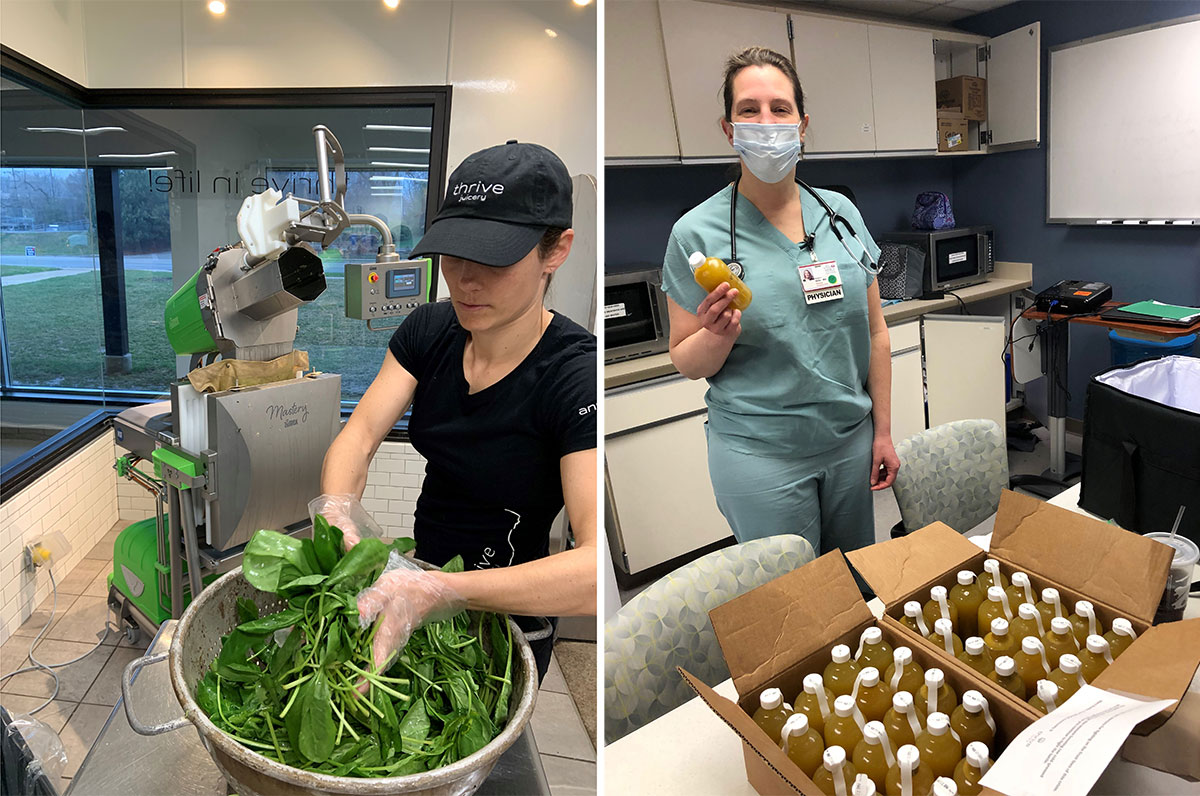
From March 14, when COVID-19 had just bubbled to Michigan’s surface, and into early June, the Mignerys delivered cold-pressed juice to staff at both Michigan Medicine and nearby St. Joseph Mercy hospital. A healthy offering — “More than three pounds of produce in every bottle,” Anna beams — the grab-and-go juice provided a nutritional pick-me-up amid days that tested bodies, minds, and souls.
“We felt a calling toward this mission, to take what we could offer and give to people who needed it most,” says Andy, a former U-M football player and cancer survivor.
By the end of April, 47 days since their first delivery, the Mignerys had made some 75 trips to the two Ann Arbor hospitals, efforts empowered by their own philanthropic spirit and the charitable actions of others. The couple matched every donation to their cause dollar for dollar and fueled their endeavor with an unrelenting sense of purpose and perseverance.
“We’ve never been busier in our lives,” Anna says. “But this is what we feel we should be doing.”
As the COVID-19 pandemic washed over the nation earlier this year, ceasing the normal cadence of daily life, Wolverines across the country emerged as forces of good. They hustled to provide support. They banded together to ease angst and uncertainty. They rallied to provide much-needed services. In ways big and small, public and private, they emerged the valiant, conquering heroes a battered world needed.
Creating Safer Environments
Hearing about the impact of COVID-19 abroad and recognizing the threat it posed to their adopted home, members of the University of Michigan Association of Chinese Professors (UM-ACP) — a group of more than 300 faculty members across all three U-M campuses — jumped into action in early March. Led by the likes of Duxin Sun, PhD’02, Lu Wang, MS’04, Dawen Cai, PhD’07, and Wen Ye, PhD’06, UM-ACP leveraged its international network of family, friends, and collaborators to collect donations of personal protective equipment (PPE) for Michigan Medicine and other area health care facilities.
“This was a personal mission,” says Sun, a professor in the College of Pharmacy.
Within weeks, UM-ACP assembled and distributed more than 100,000 face masks, 5,000 isolation gowns, 1,100 face shields, and 1,800 pairs of disposable gloves, with thousands more PPE products flowing into the donation pipeline.
“We were in a unique position to see this threat coming and connect people,” says Wang, an associate professor in the U-M School of Public Health. “This was our way to contribute to our home, a place deep in our hearts as University of Michigan alumni.”
Half a world away, the Indonesia U-M Alumni Association was leveraging the power of its network, as well as that of other Big Ten alumni associations, to purchase and distribute PPE and vitamins to hospitals across the southeast Asian nation. Raising more than $36,000, U-M alumni helped to disburse 10,000 N95-equivalent masks, 60,000 vitamins, and 400 hazmat suits to health care facilities.
“We care and want to contribute to helping the country in the fight against COVID-19,” says Indonesia U-M Alumni Association president Henry Rahardja, ’98.
Closer to home, State & Liberty, the 6-year-old apparel company founded by Steven Fisher, ’13, and Lee Moffie, ’13, shifted from making dress shirts to manufacturing reusable cloth masks. By April’s end, the Ann Arbor-based company had donated more than 15,000 cloth masks to Michigan Medicine for use in areas across its facilities, from its pharmacies to the maternity department.
“With the factory, the capacity, the supply chain, and the ability to help, we did,” Fisher says. “And it wasn’t a hard decision.”
Lending Expertise
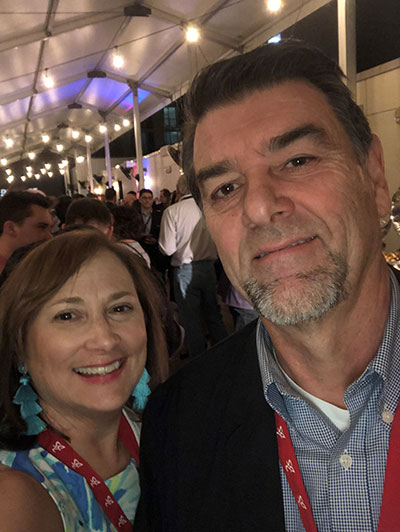
With COVID-19 cases mounting across the country, NovaStar Solutions, a Livonia, Michigan-based tech company led by Dave, ’80, and Mary Baumgarten, ’80, heeded hospitals’ urgent calls for support.
NovaStar used its fleet of industrial-grade 3D printers to create custom-made parts designed to heighten efficiency and safety at health care operations. Using a design file provided by HP, the company produced a T-shaped part that enabled BiPAP and CPAP machines (which aid breathing) to function more like ventilators (for patients who cannot breathe on their own) and then sent 100 of those parts to two Detroit-area hospitals for evaluation. NovaStar also printed and donated 150 face shield frames for health care workers at Pomeroy Living, a chain of assisted-living facilities in southeast Michigan.
“We had the tech and talent to get lots of parts out the door and into the hands of health care personnel,” Dave says. “This was a no-brainer.”
Los Angeles-based forensic accountant David Golbahar, ’06, lent his expertise to business owners struggling to make sense of the CARES Act, the federal government’s rapid response to the pandemic’s market-rattling hit. After the legislation passed on March 27, Golbahar devoured the largest economic stimulus package in U.S. history and, within two days, shared small-business-focused summaries on social media and email, encouraging small business owners to reach out to him with questions. For the next two weeks, Golbahar was glued to his phone, helping small businesses across the country — from restaurants and community newspapers to agricultural entities and retail operations — navigate the legislation’s loan programs.
“My mission was to replace the anxiety with some calm and understanding,” Golbahar says. “It’s what I could do to ameliorate the impact of the sudden shutdown and help people confront a challenging situation.”
Supporting Students
As schools across the country closed, Wolverines stood up to ensure student learning and health endured.
In Kansas City, Missouri, Betsy Brogan, ’11, vice principal at a 600-student charter school on the city’s economically challenged East Side, spent much of March designing the school’s instructional response to COVID-19. At the onset, that meant overseeing a layered process in which school buses delivered academic packets filled with math lessons, science articles, fitness plans, and the like to student homes. As Brogan’s school transitioned to remote learning for the remainder of the academic year, she then modified lesson plans with teachers, helped guide the distribution of 250 electronic devices, and arranged for internet service at about 40 households.
“This is what our students and families deserve, and a community of people worked their tails off to make sure this didn’t become another source of inequity for students,” Brogan says.
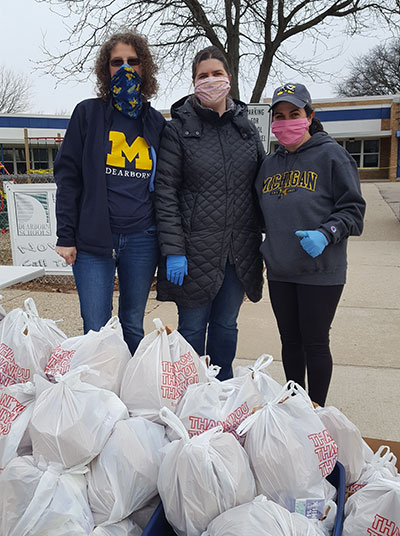
UM-Dearborn alumni Veronica Kubitz, ’92, Julia Zamarron, ’10, and Jennie Morey, ’86, MA’90, volunteered at Long Elementary in Dearborn, Michigan, where Kubitz and Morey are teachers and Zamarron is support staff. They made sure their school’s 300 students would have access to the breakfast and lunch they receive at the Title 1 school. From March through the end of the school year in June, the trio gathered food and milk from a central facility in Dearborn and assembled it for distribution at the school.
“This let our families know we were there for them,” Kubitz says.
And in Chicago, Michelle Mirzoian, MBA’06, rallied fellow U-M alumni Gary Weintraub, ’08, and Mike Carpenter, ’04, to ensure that students enrolled in the entrepreneurial education program of the Network for Teaching Entrepreneurship (NFTE) could continue accessing curriculum and mentorship. Carpenter, the head of Chicago-based Adjunct Creative, began developing a mobile app to support students’ remote learning, while Weintraub helped to assemble the volunteer army NFTE’s four-state Midwest region needed to deliver virtual coaching to students.
“Mike and Gary stepped up to make sure our students in these vulnerable areas would continue learning and get the support they needed so they wouldn’t regress,” says Mirzoian, NFTE Midwest’s director of development.
Feeding the Front Lines
Like the Mignerys at Thrive Juicery, two other U-M alumni — and former Wolverine football players — crafted efforts to feed front-line employees.
On April 2, former NFL kicker Jay Feely, ’98, launched a GoFundMe page called Food Fighters. The premise was simple: Feely would purchase meals from Phoenix-area restaurants and then deliver those meals to local hospitals, fire departments, police departments, and other front-line agencies. Within two weeks, Food Fighters had surpassed its initial $20,000 goal and delivered 760 meals to first responders.
“When you have that opportunity to help, I don’t think you can hesitate to jump in,” Feely says.
For weeks during the spring, Subway franchisee Cory Zirbel, ’10, delivered meals to Detroit-area hospitals as well as police and fire departments. As the pandemic hit, Zirbel’s wife, Jakki, ’10, MS’11, developed the idea of a $5 meal deal featuring a six-inch sub, chips, and cookie. Though the offering would mean a $2 loss on each sale, the venture allowed the Zirbels to support front-line workers and sustain their operations. Meanwhile, Zirbel’s former U-M gridiron teammate and current 10-year NFL veteran Brandon Graham, ’10, funded a 725-meal order to staff at Henry Ford Health’s West Grand Boulevard location in Detroit through Zirbel’s shops.
“We’re trying to make days brighter,” Zirbel says, “to put some relief and enjoyment into people’s days.”
That’s a feeling to which the Mignerys can relate.
“We know this is appreciated, and that’s just fueled us more,” Anna says. “If that means some late nights or early mornings, so be it. We know we have something positive to give.”
A frequent contributor to Michigan Alumnus, Daniel P. Smith has penned profiles of notable alumni such as business tycoon Sam Zell, U.S. Congresswoman Grace Meng, and Five Guys’ restaurant founder Jerry Murrell.

